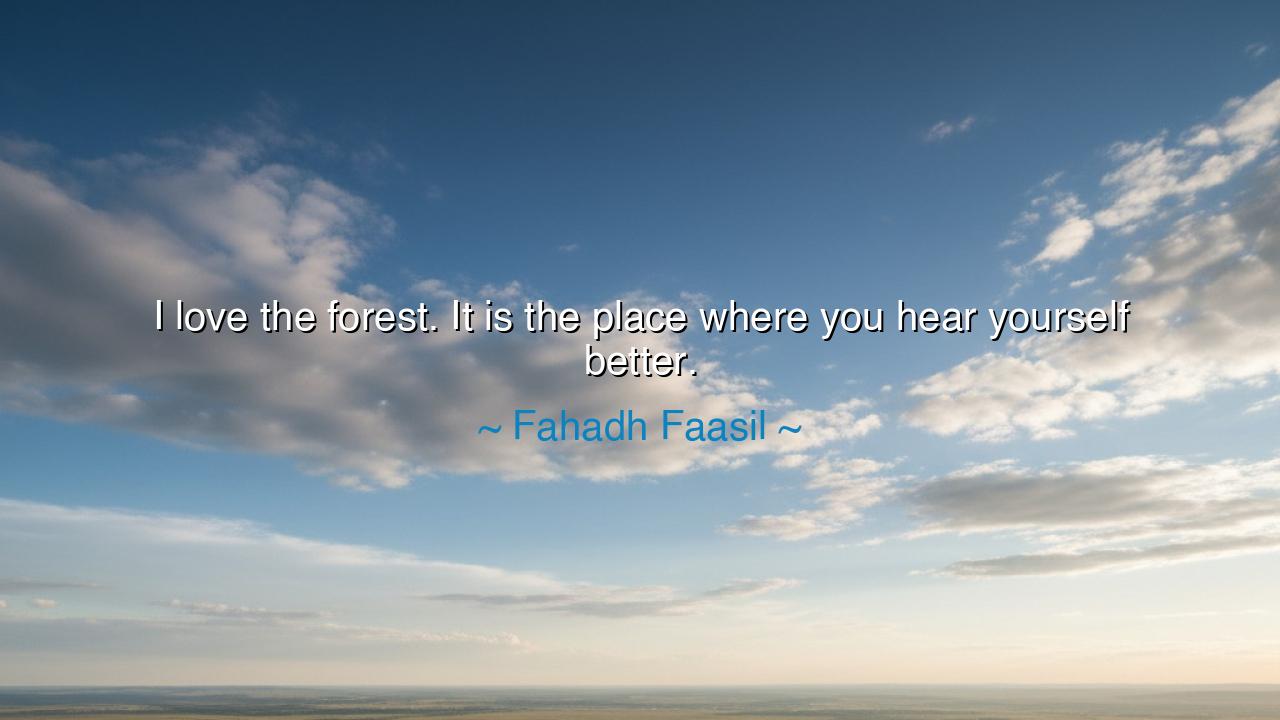
I love the forest. It is the place where you hear yourself






Hear the quiet wisdom of Fahadh Faasil, the contemplative actor and seeker of truth, who said: “I love the forest. It is the place where you hear yourself better.” In these words lies not only a love for nature but a revelation of the human soul — that amidst the stillness of trees and the hush of leaves, the heart speaks more clearly than in the noise of cities and men. The forest, ancient and untamed, is not merely a landscape of roots and shadows; it is a mirror, a sanctuary where the spirit remembers its origin. To “hear yourself better” there is to return to the rhythm of creation — to rediscover what the modern world has taught us to forget: that silence is not emptiness, but the birthplace of wisdom.
Fahadh Faasil, whose artistry is marked by introspection and subtle emotion, speaks here as a man acquainted with both solitude and self-discovery. His love for the forest is not a love of escape, but of return — return to simplicity, to honesty, to the undistracted voice of the soul. The origin of this insight lies deep within human history, for from the earliest days, the wise have sought refuge in nature to seek clarity. The Buddha found enlightenment beneath the Bodhi tree. The prophet Moses heard the divine voice on the mountain. The sages of India meditated in forests long before kingdoms rose or fell. It was never in the palaces or the markets that truth was found — but in the quiet where wind moves through branches and rivers whisper to stone.
In the forest, all things speak a language older than words. The rustle of leaves becomes a prayer, the call of a bird a reminder of freedom. When you stand among trees, time itself slows — the heart begins to beat in harmony with the earth. The mind, long burdened by noise and desire, begins to still. It is then that one hears — not with the ears, but with the soul. This is what Fahadh means when he says that in the forest, you hear yourself better. You do not hear the voice of pride, nor fear, nor the endless chatter of ambition, but the quiet truth of who you are beneath all disguises.
Consider the story of Henry David Thoreau, the philosopher who withdrew to Walden Pond to live deliberately. He built a small cabin in the woods and lived simply — planting beans, watching the seasons, listening to the wind. There, he wrote, “I went to the woods because I wished to live deliberately... and not, when I came to die, discover that I had not lived.” Like Fahadh Faasil, Thoreau sought the forest not as an escape from life, but as a way to hear life more clearly. In the hush of nature, he found not loneliness, but communion — for the forest, to those who listen, is full of company: the whispering trees, the soft murmur of water, the patient breathing of the earth.
The ancients knew that the forest was sacred because it stripped man of illusion. In the city, one hears only the noise of desire — the clamor of wealth, reputation, and power. But in the forest, those voices fall silent. There, stripped of vanity, man confronts himself as he truly is — fragile, fleeting, and yet, a part of something vast and eternal. The trees do not hurry; they teach patience. The rivers do not resist their course; they teach acceptance. To “hear yourself” in such a place is to realize that you, too, belong to this quiet order — that your worries are small beside the wisdom of the earth.
Yet the forest is not only a place of calm; it is a teacher of strength. Its silence is not empty — it is alive, filled with lessons that reveal themselves only to those who stand still long enough to listen. In its shadows, one learns endurance; in its sunlight, gratitude. Every tree that has weathered a storm teaches perseverance; every fallen leaf reminds us that endings are also renewals. When Fahadh speaks of hearing oneself better in the forest, he speaks of this awakening — the rediscovery of balance between fragility and resilience, between the transient and the timeless.
So let this be your teaching, O wanderer of the modern world: seek your forest, wherever it may be. It need not always be of trees — it may be the quiet of dawn, the stillness before sleep, the solitude of honest reflection. But you must find a place where you can listen — not to the world, but to your own heart. Turn off the clamor of devices, step away from the noise of endless wanting, and return, even for a moment, to the song of silence. There, you will find clarity; there, you will find peace.
For truly, as Fahadh Faasil said, “I love the forest. It is the place where you hear yourself better.” The forest, whether of nature or of the spirit, waits for all who seek truth. Enter it humbly, listen deeply, and you will remember that you are not apart from the world, but a note within its eternal music. When you hear yourself there, you do not hear the voice of isolation, but of belonging — the soft and steady rhythm of life itself.






AAdministratorAdministrator
Welcome, honored guests. Please leave a comment, we will respond soon